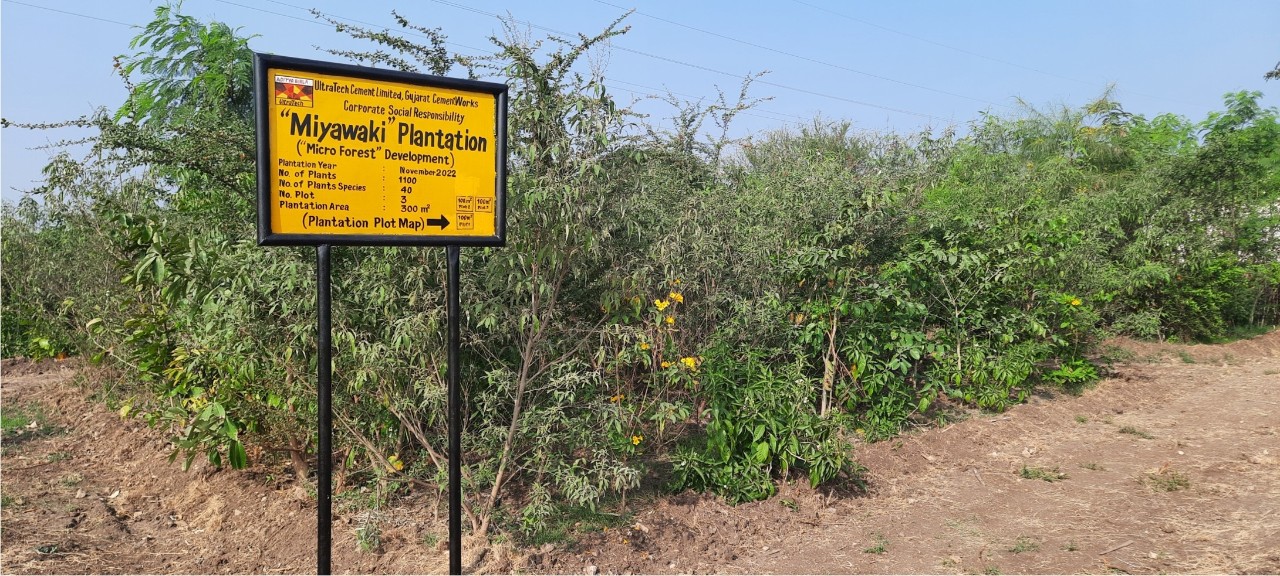About Us
Sustainability
Investors
Careers
Media

UltraTech Cement Limited proudly commemorates the International Day of Forests on March 21st. With an unwavering commitment to achieving No Net Loss, several of UltraTech’s units have embarked on Miyawaki plantation drives, contributing to a healthier planet and a greener future. Notably, both UltraTech’s integrated manufacturing facilities and grinding units have wholeheartedly embraced this movement, adopting the innovative Miyawaki technique for their afforestation initiatives.
This year’s theme, “Forests and Innovation”, as designated by the United Nations, resonates deeply with UltraTech’s efforts. It underscores the pivotal role that innovation plays in safeguarding, managing, and restoring forests. Through sustainable yet innovative practices, UltraTech is fostering sustainable forest management practices, ensuring a better world for generations to come through our commitment to build a sustainable future.
The concept of ‘Miyawaki forest’ has gained currency across the world as one of the innovative ways to combat climate change and accelerate afforestation. It is a simple concept that involves plantation of two to three trees per square metre with multi fold benefits in the long-term. This plantation approach not only helps lower temperatures in the surrounding areas but also enhances the air quality. More importantly, these Miyawaki forests are self-sustaining and help enrich the biodiversity locally.
It has some significant benefits over more traditional forestry methods when used in smaller afforestation projects. The trees planted by this method grow much faster, jump starting the forest creation process and capturing more carbon. Within the context of the current climate change emergency and stark warnings about the global loss of biodiversity, being able to create diverse, healthy forests quickly has proved vital to meeting national and international targets and tackling these issues.
Gujarat Cement Works, located in Amreli district, Gujarat, initiated their Miyawaki project in 2022. The unit has since undertaken a second round of planting and have planted a total of 3300 saplings of 40 native species in the period between Jan 2022 and Nov 2023 in a 900 square metre area.
Vikram Cement Works in Madhya Pradesh has created a self-sustaining mini-forest spanning over 2000 square metres, planting over 5800 saplings of 10 native species in the vicinity of the unit area. This project has helped produce a space-efficient, rapid-growing solution promoting biodiversity.
Bela Cement Works in Madhya Pradesh has achieved an impressive 100% success rate in their plantation efforts with 6000 saplings planted last year, while Dalla Cement Works in Uttar Pradesh has planted over 17000 saplings including Neem, Jamun, Guava, Rosewood, Ebony, Hibiscus, and Indian Gooseberry in an area of 0.5 hectares.
The grinding unit Bara Cement Works, located near Prayagraj in Uttar Pradesh, has planted 2500 saplings in a 1500 square metre area, featuring a variety of trees such as Jamun, Pakad, Peepal, Amaltas, Arun, Kadam, Neem, and Karanja, helping the unit create a vibrant green space.
Many of the species have also been chosen to provide economic benefit to the local villagers in terms of providing fodder, fuel, fruits, and flowers in addition to maximising forest’s carbon sequestration potential and recreate habitat for biodiversity and wildlife.